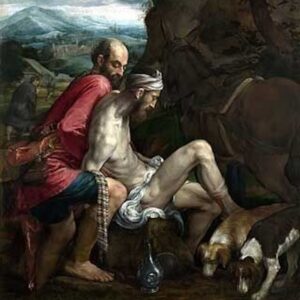Thomas Hardy’s novels are well-known and widely studied, and some of them, including Far from the Madding Crowd (1874) and The Mayor of Casterbridge (1886), have become even more popular through film and TV-miniseries adaptations. Hardy is so rewarding as a novelist, his characters so memorable, his settings so vivid and evocative, and his themes so profound, that we tend to forget he’s an outstanding poet as well. He wrote close to 1000 lyrics, most of them coming after the hostile responses to Tess of the D’Urbervilles (1891) and Jude the Obscure (1895) impelled him to turn away from fiction. There’s also his “verse drama” about the Napoleonic wars, The Dynasts, epic in length: three parts, 19 acts, 130 scenes.
I enjoy browsing in my big volume—1100 packed pages—of Hardy’s poetry, and each time I do, I make interesting discoveries: lyric gems and surprises, poems and sections of The Dynasts I had hurried past or overlooked. Recently my attention was seized by this sonnet in three stanzas, from early (1866) in Hardy’s career. It’s a difficult poem to respond to and write about. But it lingers in my mind, and I’m trying to figure out why:
Hap
If but some vengeful god would call to me From up the sky, and laugh: “Thou suffering thing, Know that thy sorrow is my ecstasy, That thy love’s loss is my hate’s profiting!” Then would I bear it, clench myself, and die, Steeled by the sense of ire unmerited; Half-eased in that a Powerfuller than I Had willed and meted me the tears I shed. But not so. How arrives it joy lies slain, And why unblooms the best hope ever sown? —Crass Casualty obstructs the sun and rain, And dicing Time for gladness casts a moan…. These purblind Doomsters had as readily strown Blisses about my pilgrimage as pain.
I assumed “Hap” was a name or nickname. There’s Hap Loman in Death of a Salesman, and Hap in the romantic film Always, a role performed by Audrey Hepburn. But here, “Hap” means something that happens without a plan or an apparent cause, not predictable, a happening, occurrence, coincidence, or accident. It implies chance, luck, fortune.
Some words and phrases are hard to say out loud—“Powerfuller” and “Crass Casualty,” for example. Why are a few capitalized and others not? “Purblind Doomsters”: who are they? I reached for my dictionary for “purblind”: nearly or partially blind, dim-sighted, slow or deficient in comprehension, imagination, or vision.
With its surmise about “some vengeful god,” the first line is scary and perplexing. Any god will do, though not the God (with a capital G) of Christianity. “Vengeful” means seeking to harm someone as payback for an injury. The speaker depicts a punitive god, dwelling at a distance, beckoning from high up, far away.
What’s the tone of this “call”? The answer arrives in the middle of line two with the word “laugh,” which is stressed and located just before the colon. The suffering speaker is not even a person. He is a “thing,” small, diminished; and, as the second line ends, the two “-ing” sounds reinforce this pained thing-ness.
The imagined god enjoys the speaker’s sorrow. It’s “ecstasy,” an overwhelming feeling of great happiness or joyful excitement. “Ecstasy” is also an emotional or religious frenzy or trance-like state that involves mystic self-transcendence. This god revels in the speaker’s loss of his love, an effect intensified by the multiple “s” sounds (“thy love’s loss”) and the exclamation point. Perhaps a relationship has dissolved, or the beloved has died. For the god, this is a benefit, gain, source of pleasure.
The first word of line three, “Know,” is stressed, breaking the iambic pattern. It heightens the knowledge the speaker imagines the god is dispensing. “Know,” furthermore, resonates as “No,” driving home denial, rejection, and loss. The vengeful god is fixed, unwavering, in its vindictiveness.
Human misery hence comes from a hostile power. It’s not a verdict on our misconduct: we’ve done nothing to warrant the hurt. Then again, this god, with a small “g,” might not even exist. For the speaker is conducting a thought-experiment about the consequence of his “If but…” theorizing.
Unlike Job, Hardy’s speaker doesn’t talk back to divine authority. Instead, he describes how he would react: he would bear it, endure it. Next, in a stronger image, he refers to a “clench,” implying hands or fingers closing tightly into a ball: he would “clench” and then die. The speaker is in wretched shape, tearful, yet there’s consolation for him in knowing he hasn’t done anything to deserve this fate.
“But not so”: three monosyllables, then a pause. The speaker has returned to reality, and, it seems, he takes satisfaction in the execution of his hope. “Unblooms”: nature reverses itself for him. His plight is unique—the demise of “the best hope ever sown.”
Hardy shifts to other figures and forces, printed in capitals, magnified: Crass Casualty, Time, Doomsters. “Crass Casualty” is a tongue-twister. “Crass”: lacking sensitivity, refinement, or intelligence, gross, unfeeling; “Casualty”: a person injured or killed in battle, which connects with killing in “slain,” but here, in an archaic sense, with the operation of chance or fortune as well.
The image of “dicing Time” is lurid: “dicing” evokes the playing of dice, a game of chance, and the slashing and slitting of a knife, a person or object cut to pieces. A “doomster” is invested with authority as a judge, and it summons up “doomsayer,” someone given to forebodings and predictions of calamity.
Hardy’s speaker has assigned agency to powers that oppress him, but now he turns in a different direction. The image of the dice and “purblind”: bad things are done to us at random, and that’s because the celestial beings, the cosmic forces, are not completely in control. They roll the dice and observe the result, whatever it turns out to be. The speaker doesn’t know why his hope and joy were lost. He’s on a pilgrimage, but its goal isn’t stated, possibly because it’s not known. Life could be full of blisses. But—the final word—it’s “pain,” anguish and agony.
In “Hap,” Hardy describes a feeling common to all of us at some moments: that life is cruelly unfair and inexplicable. Through his rough, jagged artistry, Hardy creates the point of view and tone of indignant complaint. “Hap” stops there, however, and, to me, this is its limitation: I can’t accept descriptions of life that enclose us in blame and acrimony.
That’s my judgment, but, as I hear myself state it, it sounds too easy and self-approving. “Hap” expresses a bleak, damaged state of mind we recognize, especially about the fragility and transience of love. We know the reality of loss, separation, and death, that no one is exempt from the wounds existence inflicts on us. Are we toys of gods who kill us for their sport? No, we reply, not true. But if life is not like that, how is it organized instead? Hardy is forcing us to ask this question, and he doesn’t believe we can answer it.
William E. Cain is Mary Jewett Gaiser Professor of English at Wellesley College, where he enjoys teaching courses on Ralph Waldo Emerson, Henry David Thoreau, and other American writers. His recent publications include essays on Edith Wharton and Ernest Hemingway.





